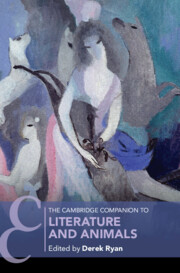Book contents
- The Cambridge Companion to Literature and Animals
- The Cambridge Companion to Literature and Animals
- Copyright page
- Contents
- Figures
- Contributors
- Introduction
- Part I Literary Periods
- Part II Contexts and Controversies
- Chapter 8 Religion
- Chapter 9 Anthropomorphism
- Chapter 10 Habitat
- Chapter 11 Captivity
- Chapter 12 Indigeneity
- Chapter 13 Biocentrism
- Chapter 14 Health
- Select Bibliography
- Index
- Cambridge Companions To …
Chapter 12 - Indigeneity
Posthumanist Fantasy and Weird Reality
from Part II - Contexts and Controversies
Published online by Cambridge University Press: 26 October 2023
- The Cambridge Companion to Literature and Animals
- The Cambridge Companion to Literature and Animals
- Copyright page
- Contents
- Figures
- Contributors
- Introduction
- Part I Literary Periods
- Part II Contexts and Controversies
- Chapter 8 Religion
- Chapter 9 Anthropomorphism
- Chapter 10 Habitat
- Chapter 11 Captivity
- Chapter 12 Indigeneity
- Chapter 13 Biocentrism
- Chapter 14 Health
- Select Bibliography
- Index
- Cambridge Companions To …
Summary
In earnest efforts to disrupt the racialized space of Anthropocene conversations, Indigenous epistemological alternatives have emerged as exceptional antidotes to ecological despair with privileged access to nonhuman and interspecies lifeworlds. While many Indigenous approaches do offer beneficent alternatives, their broadscale characterization tends to deposit fresh essentialisms in the wake of the old, and battles over intellectual privacy and appropriation frustrate coalitional urgency. Thus, the very incommensurability that these new approaches seek to demolish – those nourished by the imperial practices we aim to counter – are rejuvenated. Simultaneously, Indigenous critical thought continues to herald its singular capacities for reclamation, and at the same time to police its appropriation, at once demanding and rejecting inclusion in serious academic and scientific conversations. Drawing on Timothy Morton’s concept of the “weird” as a way of conceptualizing human embeddedness in a vast biosphere of nonhuman others that both contains and erases us, this chapter argues that a politics of action based on exceptional epistemologies and myths of alterity cannot succeed. We are tangled in a structural universe where fictions of difference – not just between humans and nonhumans, but among humans themselves – emerge from the very systems we seek to explode.
Keywords
- Type
- Chapter
- Information
- The Cambridge Companion to Literature and Animals , pp. 220 - 235Publisher: Cambridge University PressPrint publication year: 2023

